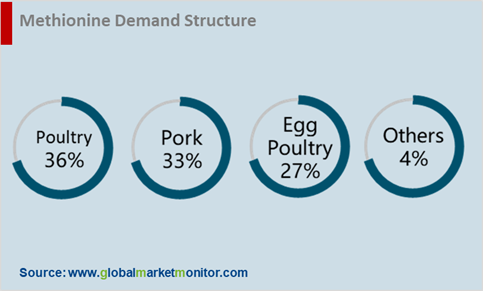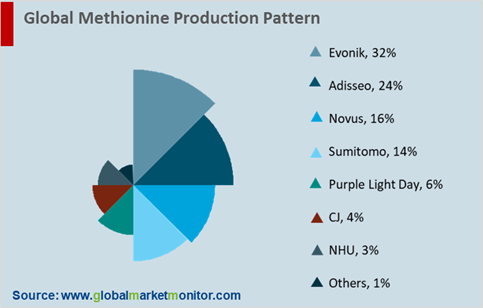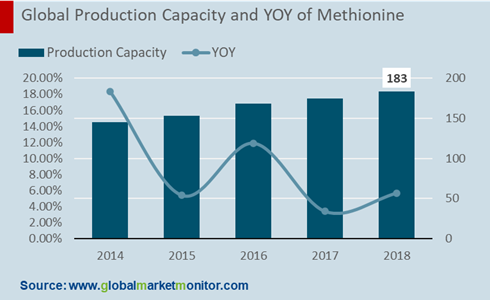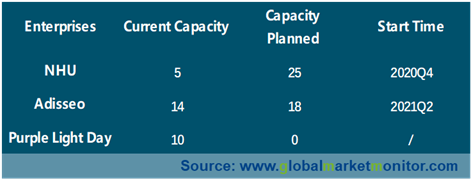In protein synthesis, methionine is the first step in the process of translating information RNA into protein. The synthesis of protein biology is unable to start without the methionine. Methionine is not only the raw material for protein and cysteine synthesis, but also participates in the methyl transfer, phosphorus metabolism in animals, and the synthesis of adrenaline and others. When the human body is short of methionine, it will cause many serious problems including loss of appetite, slow growth or little weight gain, and etc. Methionine is an important element of pharmaceutical industry, feeding industry, cosmetology industry. The improvement of people's material living standard and the change of consumption concept make the global methionine market grow steadily.
At present, there are four kinds of methionine on the market, which involve the solid methionine, the liquid methionine, and liquid methionine sodium, showing a situation that more than 80% of methionine in the world is mainly used as feed additives, of which the consumption structure of methionine for feed is following.

Domestic Demand Is Mainly for the Solid Methionine with the Import Rate of 60 Percent
The demand of methionine in our country is mainly the solid methionine. Because the liquid methionine needs to be added by spraying with professional equipment, the penetration rate of liquid methionine in countries with low level of breeding and feed industrialization is generally lower than 20%. The domestic methionine still needs to be imported in large quantities. The annual demand for the solid methionine in China is about 230,000 tons, while the domestic enterprises to make the solid methionine only have NHU and Purple Light Day. Since the total output of both in 2018 is about 100,000 tons, the remaining demand is met in the form of import to cause a high import rate of 60 percent, taking 70 percent of domestic market scale mainly from Singapore, Japan and Malaysia. Evonik, Adisseo, and Novas, and Sumitomo account for about 85% of the global market share.

Domestic Suppliers Benefit from the Epidemic
The domestic methionine production capacity is only 15% and the foreign capacity is as high as 85%. Under the epidemic, the US and Europe are in the epicenter, who account for 23% and 29% of the global production capacity. Methionine prices rose in the short term as the epidemic has not only reduced the supply of methionine but also disturbed the global methionine industry chain. Domestic suppliers are expected to pull the global supply chain even move the methionine production domain to China, and improve the market share and penetration rate of domestic methionine with the domestic epidemic becoming more and more stable.
The Anti-Dumping Activity Reduces Market Supply by 50%
On April 10, 2019, the Ministry of Commerce issued a notice to investigate the anti-dumping of methionine imported from Singapore, Malaysia and Japan. Since the methionine supply in China mainly depends on imports and foreign manufacturers account for 50% of domestic demand, including 88,000 tons imported from Singapore Evonik factory, 34000 tons imported from Malaysia factory and 41,000 tons imported from Japan Sumitomo. They have the absolute right to determine the domestic market price, resulting in the continuous downturn of domestic methionine price and impact on the domestic suppliers to maintain operations. Once the anti-dumping investigation is implemented, there will be huge space in the supply of methionine in China, which offers a great opportunity for the domestic manufacturers.

China is the second-largest poultry producer in the world, at present, whose demand for methionine is growing steadily. Meanwhile methionine consumption in the Asia Pacific region accounts for nearly 42% of the world's total consumption, and China for 20%. With the continuous increase of the global population and living standards, the demand for methionine in the global market has maintained a rapid growth trend for a long time, which is expected to grow at CAGR of 8%. In addition, the healthy diet, fresher, more natural and more nutritious, is performed by the increasing people in China, which means a greatly point to grow up.
At present, China has a demand for methionine reaching 17 million tons of chicken every year, accounting for about 18% of global production. With the strengthening of health management, people are more and more accepting of healthier diet methods such as white meat, which will further stimulate the chicken consumption of China, India and other emerging countries, and also help to expand the penetration rate of liquid methionine market.

We provide more professional and intelligent market reports to complement your business decisions.